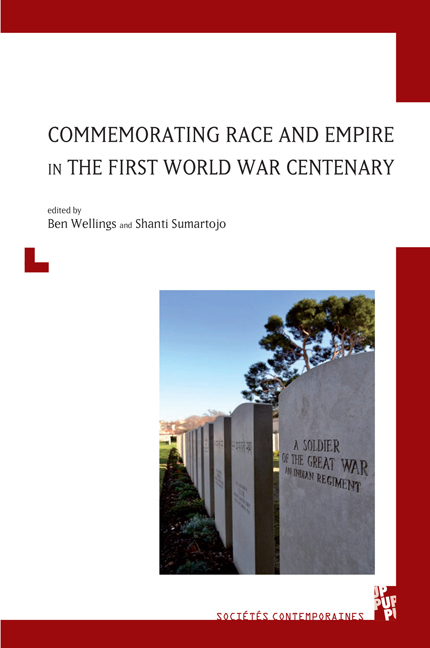Book contents
- Frontmatter
- Contents
- Commemorating Race and Empire in the First World War Centenary
- Rediscovering and Rehabilitating Empire, 2014-2018
- Representing Race and Empire, 1900-1920
- Resénégalisation and the Representation of Black African Troops during World War One
- ‘A Strange, New Race’: Eugenics and the Australian Soldier in the First World War
- The First Circle of Memory: First World War Postcards of British Imperial Troops in Marseilles
- Aesthetic Form and Political Function: Representations of French Algerian and British Indian Troops in First World War Recruiting Posters
- Memorialising Race and Empire in Settler Societies, 1919-2018
- Contibutor Biographies
- Index terms
‘A Strange, New Race’: Eugenics and the Australian Soldier in the First World War
from Representing Race and Empire, 1900-1920
- Frontmatter
- Contents
- Commemorating Race and Empire in the First World War Centenary
- Rediscovering and Rehabilitating Empire, 2014-2018
- Representing Race and Empire, 1900-1920
- Resénégalisation and the Representation of Black African Troops during World War One
- ‘A Strange, New Race’: Eugenics and the Australian Soldier in the First World War
- The First Circle of Memory: First World War Postcards of British Imperial Troops in Marseilles
- Aesthetic Form and Political Function: Representations of French Algerian and British Indian Troops in First World War Recruiting Posters
- Memorialising Race and Empire in Settler Societies, 1919-2018
- Contibutor Biographies
- Index terms
Summary
When Pierre Nora launched his study of the historical concept of ‘collective memory’ in France in the late 1970s, he emphasised the idea that a group's identity constantly integrates its sense of the past. When this memory is connoted as ‘national’ what is retained as the past is influenced by shifting politics of identity. One hundred years after the participation of a newly federated Commonwealth of Australia in the Great War, the different projects to commemorate the event will necessarily seek to apply a social ‘use’ of memory. Removed in time from the moment when military deeds were seen as essential for national emergence, in Australia the Great War has followed a historiographic trajectory from stories of imperial or colonial heroism, to contestation, controversy, revived national pride, but also shame and sorrow. Nevertheless, the tradition known as Anzac, marked by the annual public holiday Anzac Day, conceived of in 1916 as a future memory for Australians and New Zealanders, has remained central to the calendar. The centenary of the War has seen Australians strive to include some aspects or historical actors of the War ostensibly forgotten by the tradition. One can note a number of press articles and a TV series on the role of women as nurses and political organisers; there has also been sustained media coverage and a major play on Indigenous soldiers, as well as interesting emerging research on the multi-ethnic character of the Australian Imperial Force who fought through the four years of war. The official organisers of the centenary planned events to commemorate some of the lesser-known battles where Australians fought, while media debates over what some have perceived as an over use of war memory have abounded. The centenary has also witnessed a renewed fascination with the work and life of Australia's noted war correspondent and official historian, Charles Edwin Woodrow Bean. From the 2010 documentary Bean's Great War, to the biography by Ross Coulthart published in 2014, 3 to a commemorative stamp, Bean's key role in the Anzac tradition has not been forgotten. The website of the Australian War Memorial updated during the centenary commemorations, has always showcased the historical role played by Charles Bean, named on the site as a ‘founding father’ of this memorial that he himself imagined, an edifice that dominates the urban plan of the nation's capital.
- Type
- Chapter
- Information
- Publisher: Liverpool University PressPrint publication year: 2018



